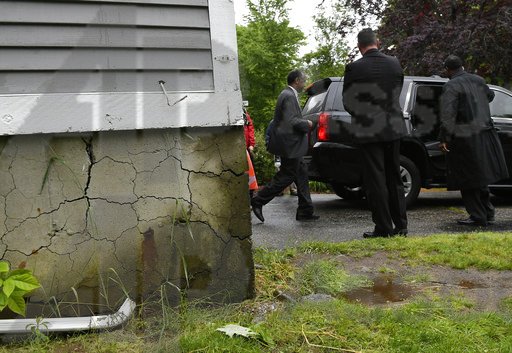HARTFORD, Conn. — Connecticut lawmakers were urged Friday to pass additional legislation to address the state’s crumbling foundations problem and also find additional funds to help impacted homeowners.
Michael Marglaras, superintendent of the Connecticut Foundation Solutions Indemnity Co., said it is good news the entity created by the General Assembly has begun paying claims, but there are already $57 million in claim liabilities and only $18.6 million in cash on hand. He said 507 homeowners have so far filed applications for financial assistance. Many more are expected.
“That sounds a little bit like state government,” he said, likening the captive insurance company’s balance sheet to the state’s deficit struggles. He predicted the captive insurance company will be “shut down” by this time next year, unless additional funds are identified.
Marglaras has warned lawmakers previously the $100 million in state bonding and proceeds from an annual $12 fee on homeowner insurance policies is not enough to help the estimated thousands of homeowners in eastern and central Connecticut whose foundations are deteriorating from the presence pyrrhotite, an iron sulfide that has reacted with naturally over time with water and oxygen.
From the applications he has reviewed so far, Marglaras said the average cost to replace a concrete foundation is $168,000. The captive insurance company is capped at providing up to $175,000. He said the overall average cost of remediating a home, a price that includes replacing the concrete as well as decking, interior work and other things, has averaged $202,000 per home.
Most affected homeowners have been unable to have those costs covered by their homeowners’ companies. Three insurance companies have so far provided $15.5 million to a fund to help policyholders bridge the gap between what they receive from the captive insurance company and the overall cost fixing their home, but lawmakers made it clear Friday they expect insurers to do more.
There have also been ongoing efforts to obtain federal assistance.
Two state legislative committees held a joint public hearing Friday on nine bills aimed at addressing the problem, which impacts more than 40 communities. More than 40 bills related to the concrete problem were filed this session.
“I think we’ve made progress from where we started in 2015,” said Rep. Kurt Vail, R-Stafford Springs, who is part of a bipartisan group of lawmakers representing affected towns. But he said there’s still a long way to go to fully address a problem that has been estimated to have at least a $1 billion price tag.
“I think we’re going to be here every year trying to fix things,” he said.
Friday’s bills addressed various aspects of the crumbling foundations issue. Among other things, they would improve quarry standards, require sellers to disclose issues with pyrrhotite, and require homeowners insurance policies cover the peril of collapse, something the industry strongly opposes.
The Insurance Association of Connecticut said such legislation would have “a major negative impact on homeowners insurance premiums” in Connecticut and “may well prove to be highly disruptive of the market” and affect the “availability and affordability of insurance for every homeowner in Connecticut” since all homeowners would have to purchase coverage for a new peril.
“Insurers would need to adjust premiums to account for an expensive new risk. This would affect the price of insurance for every homeowner in Connecticut,” according to a statement from the association. “It is important to recognize that homeowners insurance is not a home warranty contract — it is neither designed nor intended to cover slow deterioration or wear and tear. Homeowners insurance is for sudden, accidental losses.”
Was this article valuable?
Here are more articles you may enjoy.


 Berkshire Utility Presses Wildfire Appeal With Billions at Stake
Berkshire Utility Presses Wildfire Appeal With Billions at Stake  Hackers Hit Sensitive Targets in 37 Nations in Spying Plot
Hackers Hit Sensitive Targets in 37 Nations in Spying Plot  Navigators Can’t Parse ‘Additional Insured’ Policy Wording in Georgia Explosion Case
Navigators Can’t Parse ‘Additional Insured’ Policy Wording in Georgia Explosion Case  LA County Told to Pause $4B in Abuse Payouts as DA Probes Fraud Claims
LA County Told to Pause $4B in Abuse Payouts as DA Probes Fraud Claims 